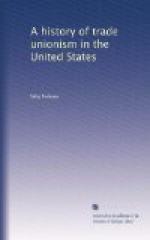These latter, having started in the seventies as Marxian socialists, had been made over into opportunistic unionists by their practical contact with American conditions. Their philosophy was narrower than that of the Knights and their concept of labor solidarity narrower still. However, these trade unionists demonstrated that they could win strikes. It was to this practical trade unionism, then, that the American labor movement turned, about 1890, when the idealism of the Knights of Labor had failed. From groping for a cooperative economic order or self-employment, labor turned with the American Federation of Labor to developing bargaining power for use against employers. This trade unionism stood for a strengthened group consciousness. While it continued to avow sympathy with the “anti-monopoly” aspirations of the “producers,” who fought for the opportunity of self-employment, it also declared that the interests of democracy will be best served if the wage earners organized by themselves.
This opportunist unionism, now at last triumphant over the idealistic unionism induced by America’s spiritual tradition, soon was obliged to fight against a revolutionary unionism which, like itself, was an offshoot of the socialism of the seventies. At first, the American Federation of Labor was far from hostile to socialism as a philosophy. Its attitude was rather one of mild contempt for what it considered to be wholly impracticable under American conditions, however necessary or efficacious under other conditions. When, about 1890, the socialists declared their policy of “boring from within,” that is, of capturing the Federation for socialism by means of propaganda in Federation ranks, this attitude remained practically unchanged. Only when, dissatisfied with the results of boring from within, the socialists, now led by a more determined leadership, attempted in 1895 to set up a rival to the Federation in the Socialist Trade and Labor Alliance, was there a sharp line drawn between socialist and anti-socialist in the Federation. The issue once having become a fighting issue, the leaders of the Federation experienced the need of a positive and well rounded-out social philosophy capable of meeting socialism all along the front instead of the former self-imposed super-pragmatism.
By this time, the Federation had become sufficiently removed in point of time from its foreign origin to turn to the social ideal derived from pioneer America as the philosophy which it hoped would successfully combat an aggressive and arrogant socialism. Thus it came about that the front against socialism was built out from the immediate and practical into the ultimate and spiritual; and that inferences drawn from a reading of Jefferson’s Declaration, with its emphasis on individual liberty, were pressed into service against the seductive collectivist forecasts of Marx.




